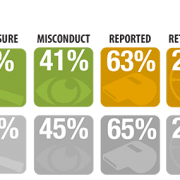Week That Was in Ethical Systems, 4/28/14-5/4/14
Is Ethics Winning in Business? Chart Points to That Trend, in The Wall Street Journal
The Dow Jones Risk & Compliance annual anti-corruption survey indicates a decrease in the number of companies reporting they lost business to an unethical competitor (down to 33% from 45% last year). Along with this year’s National Business Ethics Survey, this report paints an encouraging picture of the recent upward trend in business ethics. As the moral lapses of organizations and theories concerning their prevention continue to permeate the news cycle, we are glad to see that the increased focus on business ethics is leading to a climatic shift in how companies consider and pursue ethical systems design.
The Inner Workings of the Executive Brain, in The Wall Street Journal
Technically this article came out the evening of April 27, but it’s just too good to pass up. Surveying the discoveries of neuroimaging researchers, the author rounds up a few key takeaways for business leaders: (1) Deadlines often limit our thinking and lead to much worse decision-making; (2) Uncertainty also leads to bad choices; (3) The best leaders seem to rely on their emotions much more than logic; and (4) The secret to inspirational leadership is positivity: motivating people through encouragement, praise, and rewards. The full article is well worth a read. As the science advances, neuroimaging techniques may help us solve many mysteries surrounding (un)ethical conduct.
Business Ethics: 3 questions every business leader must ask, in The Jacksonville Business Journal
Most business professionals spend a great deal of time focusing on Key Performance Indicators (KPIs), such as discounted cash flows, price-to-earnings ratios, and sales projections. Organizations have developed robust data gathering and reporting mechanisms around these indicators, but compliance and ethics KPIs are generally overlooked. The author suggests that a company overseeing the implementation and effectiveness of its C&E program should ask three questions: (1) What is the strength of our ethical culture? (2) How effective are the systems we’re counting on to manage our legal and ethical risks? and (3) What are the objective metrics we’re relying on to monitor compliance and ethics system performance? To answer these questions well requires company-wide effort, as well as construct measurements and training programs dedicated to making sense of ethics as a KPI.
Business focus not in conflict with ethical HR, says ethics specialist, in HR Magazine
The Institute of Business Ethics has released a report showing that 77% of employees want a closer working relationship between HR and business ethics departments, where both exist in an organization. IBE director Philippa Foster Back told HR magazine the pressure on HR departments to drive business results is not a barrier to taking an ethical approach, and that ethics can deliver its own metrics–the trick is picking the right indicators. For smaller companies, which may not have specific HR or ethics departments, Foster Back said the ethical direction must come from “the entrepreneur who set up the business.” For more information relevant to how HR might foster an ethical climate, see our page on Personality and Personnel and contributor Adam Grant‘s discussion of givers and takers.





